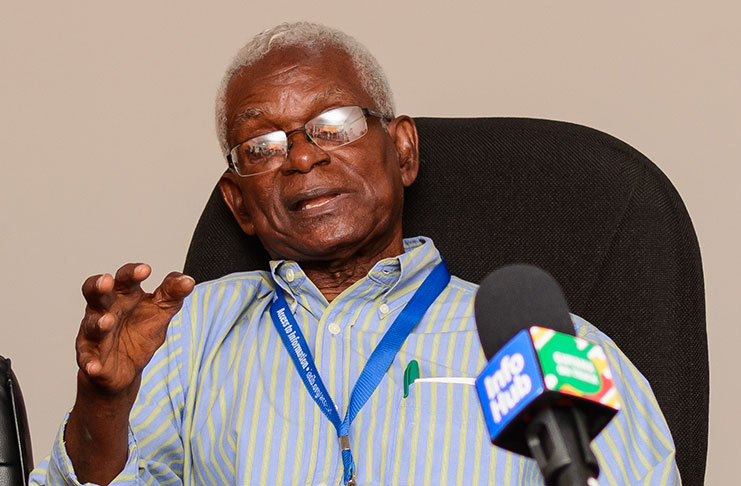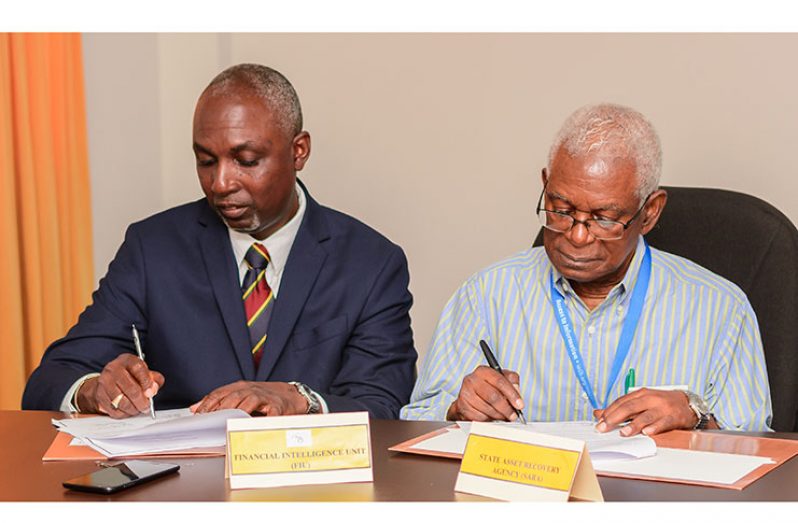…aimed at strengthening legal mechanism for court proceedings
THE State Assets Recovery Agency (SARA) and the Financial Intelligence Unit (FIU) on Monday signed a Memorandum of Understanding (MOU) to facilitate the sharing of information between the two agencies.
Director of SARA, Professor Clive Thomas, told reporters that the signing of the MOU which is in keeping with best practices will solidify cooperation between the two entities. He disclosed that the signing of the agreement was not long in the making, while noting that the two entities had an implicit understanding. “We have a lot to do by working in common. We also work in common with similar organisations, such as the Revenue Authority, the Securities Council, and the Lands and Survey to ensure they coordinate and support or activities,” he said.
Monday’s signing of the MOU, which took place in SARA’s boardroom, Main Street, was aimed at establishing a formal mechanism for joint support. “We were given the support before…the formal mechanism would primarily ensure the legality in terms of any court proceedings,” said the SARA head, who explained that there has been information sharing in the past but having the information is not enough, as in court proceedings the information must be submitted in the form of evidence.

“Therefore we must have a legal basis on which we transfer that information to them. The movement in this direction is an important step in the building of a legal foundation, for seeking to recovery both the assets of the state and also preventing money laundering and terrorist financing,” Professor Thomas reasoned.
He said SARA and the FIU are mandated by both international law (convention) as well as domestic law to cooperate, because both entities share the same set of goals which relate to the reduction of corruption both as a national good and as an international obligation. Professor Thomas explained that the increasing tendency globally is the recognition that the fight against corruption is the fight for the welfare and well-being of the broad masses of the population of the entire globe. He noted that public corruption has been identified as the single biggest deterrent to development.
“Assets that are taken unlawfully from the state and returned back to the people of the state constitute an increasing amount of resources for their welfare. Our target at this point in time is to bring cases to the court in the third quarter of this year, which means right after the end of June,” he stated.
SARA’s Director said too that his agency’s fight against corruption is supported by several international agencies. Last week, SARA officials interacted with representatives of the FraudNet firm and the Caribbean Institute of Forensic Accounting who are working with the entity to identify and retrieve Guyana’s assets held overseas.

“We are working hand in hand with them to recover some state assets which have been unlawfully removed from the State of Guyana,” said Professor Thomas. He said efforts are increasingly being made to encourage symbiotic relations among anti-corruption agencies to ensure justice is achieved.
BEST PRACTICES
Meanwhile, Director of the FIU Matthew Langevine described the signing of the MOU as in keeping with international best practices. He, like Professor Thomas, said the aim of the MOU is to foster cooperation and allow for the sharing of intelligence between the two agencies, thereby ensuring effectiveness in the execution of their respective functions.
The FIU acts as the national reservoir of financial information has recognised importance of having access to the “widest possible range” of information that can help us promote and intensify its mandate. This includes facilitating the detection and deterrence of money laundering, terrorism and other financial and serious offences.
“The quality of the intelligence product expected to be produced by the FIU must be of the highest quality that sufficient supports the work of the law enforcement agencies. It therefore cannot operate in isolation but must ensure collaborative arrangements are in place and are relevant stakeholders and authorities within the AML/CFT framework are involved,” said Langevine.
The FIU Director said too that critical to his entity’s mandate is ensuring that as the custodian of personal information, data protection is critical. It means therefore that the sharing of information must be done in a structured manner.
“This MOU would ensure that our respective agencies conduct their statutory duties in a safe and responsible manner,” he stated, noting that money laundering and terrorist financing are connected to other serious offences though they may take different forms. Langevine stated that the legal basis of the MOU is vested under Section 9 (4) (n) of the Anti-Money Laundering and Countering the Financing of Terrorism Act (AML/CFT), to enter into agreements or arrangements with domestic agencies for the sharing and or exchange of information.
He reminded that Guyana is in the midst of its fourth round of mutual evaluation preparation and satisfying the requirements of the process is of importance to Guyana, as such the second Financial Action Task Force’s (FATF) recommendation which requires that there be cooperation with AML/CFT efforts amongst all relevant stakeholders here. The FIU Director also pointed to recommendation 29, which speaks to the need for the FIU being able to demonstrate its effectiveness in sharing its intelligence product with all relevant authorities.
The FIU was established under the APNU+AFC coalition government is aimed at detecting money laundering and terrorist financing among other financial and serious offences. Langevine also disclosed that since the establishment of his unit more than 25 intelligence reports were submitted to the Special Organised Crime Unit (SOCU), an arm of the Guyana Police Force (GPF). He explained that while those reports were submitted amendments to the relevant legislation were necessary, as the old legislation indicated that cases were to be tried summarily and ought to have been completed within six months of the investigations.
“This affected many of the cases that were under review,” he said, and assured that those cases were not abandoned by SOCU.
“They are still getting legal advice and direction on them. We have continued to provide intelligence reports since that amendment which was completed in September last year, and so, since then in excess of five new cases under the revised legislation are under continuous investigation,” the FIU Director disclosed.












